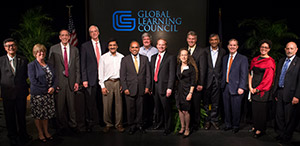Leaders Meet To Advance Teaching and Learning

Leaders in education at the GLC meeting

For the promise of technology-enhanced learning to be realized, stakeholders from across academia, government and industry must coordinate to set standards and protocols and advance best practices.
That is the goal of the Global Learning Council, which has laid the groundwork to improve learning outcomes for students everywhere.
The council's inaugural face-to-face meeting took place Sept. 4-5 at Carnegie Mellon University and the University of Pittsburgh.
Over the course of the next year, the council will create principles for sharing learning data and develop understandable criteria and evidence for best practices in teaching and learning. An initial draft of these principles and criteria are targeted for presentation to members of the American Association of Universities and the Association of Public and Land Grant Universities next spring.
"I am encouraged by the enthusiasm and the passionate commitment to the vision and the mission of the GLC that was exhibited by GLC members and attendees at the inaugural meeting. The members of GLC look forward to the task of developing a framework with the principles, criteria, examples and best practices for the issues collectively identified at the meeting for improving outcomes for learners worldwide” said CMU President Subra Suresh, who serves as chairman.
The GLC was established last November concurrent with the launch of The Simon Initiative at CMU. The Simon Initiative aims to accelerate the decades of learning science research at the university, which has been employed to improve teaching techniques and methodologies, and develop technology tools, such as cognitive tutors, for improving learning outcomes.
Student data privacy is a hot button issue for the practice of learning science. Anant Agarwal, CEO of edX, the largest provider of Massive Open Online Courses, said that if the Global Learning Council can help build a consensus on how student data can be "de-identified," he would be willing to release the billions of pieces of learning data edX has collected from its online courses since it was founded in 2011, so that learning scientists can conduct experiments using that data that can lead to teaching tools and methods that provide improved learning outcomes.
"As scientists and educators, we have a responsibility to ensure that we are using the tools of science to improve learning outcomes," said Ken Koedinger, co-director of the Pittsburgh Science of Learning Center and professor of psychology and human-computer interaction. "We are pleased to host the first meeting of the Global Learning Council on our campus and look forward to facilitating further advances in understanding the mystery of learning and in improving modern approaches to education. These are challenges too large for any one institution or sector. By bringing key players together from many sectors, the GLC will work together toward the best possible future for the students of the world."
Topics addressed at the meeting included:
- The Role of Learning Science in Learning Gain: Best Practices and How To Practice Them
- Big Data in the Service of Better Learning
- What About K-12? Technology-Enhanced Learning in Service of Young Learners' Readiness
Featured speakers for the event, which received support from the National Science Foundation (NSF), included Tom Kalil, deputy director for Technology and Innovation of the Office of Science and Technology Policy, The White House; Joan Ferrini-Mundy, assistant director of the National Science Foundation for Education and Human Resources; Jim Shelton, deputy secretary of the U.S. Department of Education; and Luis von Ahn (CS'03, '05), CMU professor of computer science and CEO of Duolingo, whose language tutoring app was named Apple iPhone App of the Year for 2013.
"A large gap exists between the potential of Learning Science and Technology to improve educational outcomes and the status quo," Kalil said. "Our aspiration should be the development of technologies that have large impacts on learning outcomes in core academic subjects."
There were demonstrations of exciting learning technologies from GLC delegates and members of the CMU and University of Pittsburgh communities. CMU and Pitt have been partners in the operation of the Pittsburgh Science of Learning Center, funded by NSF. This partnership resulted in the creation of DataShop, one of the world's largest open repositories of human learning data and analytical tools for testing educational principles and methods.
Members of the Global Learning Council are:
- Subra Suresh (chair), president, Carnegie Mellon University
- Anant Agarwal, CEO, edX
- Pat Gallagher, chancellor and CEO, University of Pittsburgh
- Anoop Gupta, distinguished scientist, Microsoft Research
- Sal Khan, founder and executive director, Khan Academy
- Daphne Koller, co-founder, Coursera
- Alan Leshner, CEO, American Association for the Advancement of Science
- Peter McPherson, president, Association of Public and Land-grant Universities
- Hunter Rawlings, president, Association of American Universities
- Andrew Rosen, chairman, Kaplan Inc.
- Alfred Spector, vice president of research, Google
- Tan Chorh Chuan, president, National University of Singapore, and chair, Global University Leaders Forum for the World Economic Forum
- Suzanne Walsh, deputy director postsecondary success, Bill & Melinda Gates Foundation
- Carl Wieman, Nobel laureate and professor of physics & education, Stanford University
Related Links: Webcast | Global Learning Council | The Simon Initiative | Pittsburgh Science of Learning Center
